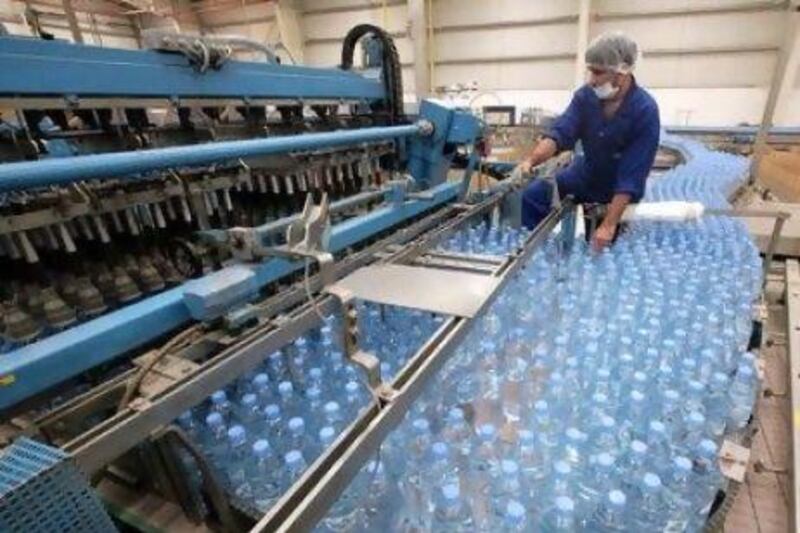Consumers face paying more for bottled juice and water as the cost of plastic bottles soars, and rising oil prices threaten to lift them further, industry insiders say.
Food producers and packaging makers said the price of PET, a material used in plastic bottles and derived from oil, had risen by as much as 50 per cent in the past year.
Rami Benjamin, the business development manager for Masafi, which produces bottled water, juice and snack foods, said the cost of the PET resin had increased from US$1,500 a tonne to $1,520 in the past two weeks.
If the unrest in the region, particularly in Libya, continues to drive up oil prices, it must be passed on to the consumer, Mr Benjamin said.
"We try to absorb this but definitely, if it reaches a point where we don't have any [profit] margins, definitely there should be a price increase," he said.
Retailers have been struggling to cope with the soaring cost of key commodities such as wheat and sugar. The rally has already taken a bite out of food producers' profits, forcing some to raise their prices. But as oil prices passed $100 a barrel to 30-month highs, propelled by unrest in oil-producing countries such as Libya, the extra costs are weighing heavily on the bottom lines of food producers and sellers.
The cost of PET plastic rose by between 30 and 40 per cent last year as the high cotton prices drove up demand for polyester fibres, said Martin Wiesweg, the director of aromatics polymers for Europe, Middle East and Africa at the petrochemical consultancy CMAI.
"There has been strong demand coming out of the textile industry, particularly in China," Mr Wiesweg said. "It has been driven by this massive, massive increase in cotton prices. So rising demand from the textile industry has tightened the market for PET feedstocks."
This short supply has allowed PET makers to lift their margins, he said. If oil prices continued to rise, prices would be pushed up further.
Manufacturers' healthy profits may counter these effects but not in the long term, Mr Wiesweg said.
Fasahat Beg, the general manager of consumer business at Agthia Group, which produces Al Ain Water, said the company had absorbed the higher expenses thus far.
"Across the group you're seeing an increase in commodity prices, whether it is wheat, sugar, whether it is PET," Mr Beg said. "It has an impact on your manufacturing costs … We've been able to absorb the costs, but there will be a point in time where it's getting unmanageable."
Nidal Haddad, the chief executive of Al Bayader International, which produces plastic containers for Carrefour and Spinneys in the region, said his company had already raised its prices by 8 per cent.
If the cost of PET resin rises further, Al Bayader may have to raise its prices again, Mr Haddad said.
"I cannot predict but if the political instability will remain in our region, definitely these prices will keep going up," he said on the sidelines of the Gulfood exhibition in Dubai, which opened on Saturday. Kadir Gunduz, the chief executive of Aujan Industries, which produces Vimto and Rani juices, said the company had felt the pinch from rising PET and aluminium costs.
Mr Gunduz estimated the cost of aluminium for drink cans has risen from $1,900 a tonne about nine months ago to $2,600 a tonne today.
Freight costs are set to rise further as the cost of fuel increases, he said.
"We try to mitigate the impact by focusing on efficiencies," he said. "We operate in an affordable beverage segment, so we cannot always pass these on to the consumer."
The industry is already under pressure from pricier ingredients such as fruit concentrate. Monther al Harthi, the chief executive of the Saudi Arabian beverage maker Al Rabie, said poor weather in growing areas had hit crops.
"The prices have extremely increased," Mr al Harthi said. "The orange concentrate, the mango concentrate - most of all the concentrates we use has gone up."
The situation shows the need for better food security in the UAE, which imports up to 85 per cent of its food. Mr Beg said Agthia was working with the Abu Dhabi Government to lifts production or have more wheat storage at its plants.





